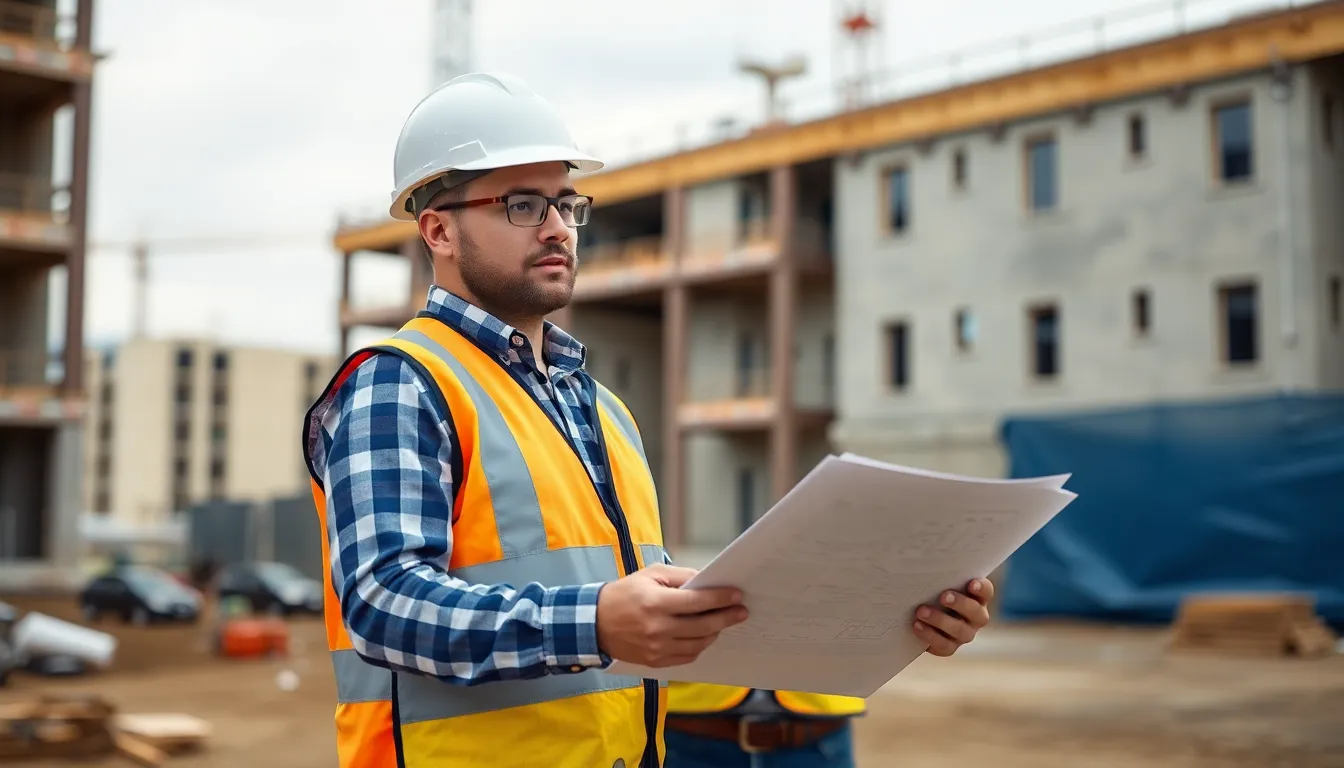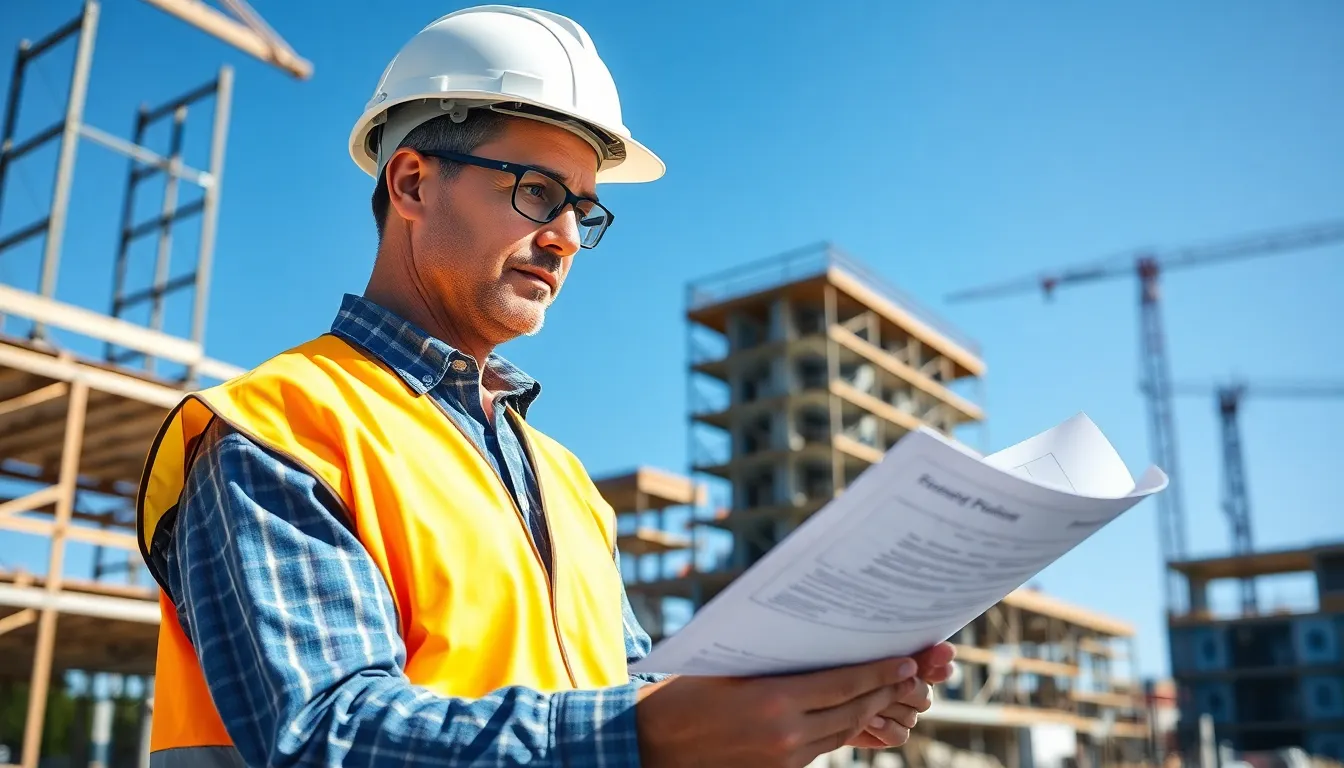In a world where skyscrapers reach for the clouds and homes are built to withstand the test of time, construction and building inspectors are the unsung heroes ensuring everything is up to snuff. Imagine a world where your dream home could crumble like a house of cards—yikes! That’s where these vigilant inspectors swoop in, armed with clipboards and a keen eye for detail.
They’re the gatekeepers of safety, quality, and compliance, making sure that every beam is straight and every nail is hammered just right. With their expertise, they not only save homeowners from potential disasters but also keep construction companies on their toes. So next time you marvel at a magnificent structure, remember: behind that masterpiece is a dedicated inspector who made sure it’s more than just a pretty façade.
Table of Contents
ToggleOverview of Construction and Building Inspectors
Construction and building inspectors play a vital role in the evaluation of structures, ensuring health and safety regulations are met. These professionals enforce standards while also facilitating compliance within the construction industry.
Role and Responsibilities
Inspectors assess building plans, conduct on-site evaluations, and verify that construction aligns with codes. They identify safety violations, review materials used, and ensure workmanship meets established standards. Their work often includes overseeing electrical, plumbing, and structural elements. When discrepancies arise, inspectors provide detailed reports outlining necessary corrections. Frequent communication with contractors and project managers helps facilitate timely resolutions. Documentation of inspections, findings, and recommendations keeps records accurate and reliable.
Importance in Construction Projects
In construction projects, inspectors serve as guardians of safety and integrity. Their assessments prevent future structural failures, protecting public safety and investment. Keeping buildings compliant with local codes avoids costly legal repercussions and delayed project timelines. Experienced inspectors enhance the overall quality of construction, fostering trust among stakeholders. They contribute to the durability and longevity of structures, ensuring they stand the test of time. Overall, their involvement instills confidence in the construction process, benefiting both builders and the community.
Required Qualifications

Construction and building inspectors must meet specific qualifications to ensure they effectively uphold safety and building standards.
Educational Background
A high school diploma or equivalent serves as the baseline educational requirement for construction and building inspectors. Many pursue further education in fields like construction management, architecture, or civil engineering. Degrees in these areas provide essential knowledge regarding building systems, materials, and construction methods. Some inspectors complete associate’s or bachelor’s degrees to enhance their understanding and improve job prospects. Courses in blueprint reading, structural design, and safety regulations are particularly beneficial for aspiring inspectors. This educational foundation equips them with critical skills necessary for performing thorough inspections.
Certifications and Licenses
Certification as a building inspector often stems from passing exams that demonstrate knowledge of local codes and regulations. Various organizations, such as the International Code Council (ICC), offer certifications that validate expertise in specific areas. State or local governments might require additional licensure to practice, mandating ongoing education to maintain this status. Some inspectors choose to specialize in areas like plumbing, electrical, or mechanical inspections, which often necessitates further certification. Attaining these credentials not only broadens their expertise but also assures clients of their competence in ensuring building safety and compliance.
Skills Necessary for Success
Success in the field of construction and building inspection requires a balanced mix of technical and soft skills. These competencies enable inspectors to effectively ensure safety and compliance in building projects.
Technical Skills
Experts in construction inspection possess a range of technical skills. Knowledge of local building codes and regulations is essential for performing accurate assessments. Inspectors often use tools like measurement devices and software for analysis. Recognizing structural defects and potential safety hazards is crucial for their role. Understanding construction methods and materials facilitates better evaluation of projects. Familiarity with specialized systems, such as electrical or plumbing setups, helps inspectors make informed decisions. Collectively, these skills empower inspectors to carry out thorough inspections and produce detailed reports.
Soft Skills
Soft skills equally contribute to an inspector’s success. Strong communication abilities enable inspectors to relay findings clearly to clients and contractors. Active listening skills foster better understanding of concerns and questions from stakeholders. Problem-solving aptitude allows inspectors to address potential issues promptly and efficiently. Time management ensures that inspections are completed within set deadlines while maintaining accuracy. Building rapport with contractors and clients creates a cooperative atmosphere for resolving discrepancies. Altogether, these interpersonal skills enhance the inspector’s effectiveness on the job.
Daily Tasks and Duties
Construction and building inspectors engage in a variety of tasks essential for ensuring safety and compliance. These daily responsibilities include thorough evaluations and precise documentation.
Site Inspections
Site inspections form a significant part of an inspector’s routine. Inspectors assess construction sites at various stages, ensuring adherence to building codes and regulations. Structural assessments often include checking the foundation, framing, and roofing systems. They examine electrical and plumbing installations, identifying potential safety hazards or deviations from approved plans. Regular visits help maintain quality control, allowing for the early identification of issues that could impact safety or compliance. Coordination with contractors during inspections ensures systematic progress and resolution of concerns.
Reporting and Documentation
Reporting generates a clear record of inspections conducted and findings observed. Inspectors compile detailed reports that highlight compliance status, safety violations, and necessary corrective actions. Documentation serves as a legal record for construction projects and often includes photographs and notes for clarity. Reports require accuracy and must be submitted promptly to facilitate timely resolutions. Communication with stakeholders hinges on these reports, enabling effective follow-up and ensuring all parties are informed of issues and requirements. Ongoing documentation supports transparency and fosters collaboration between inspectors, contractors, and clients.
Challenges Faced by Inspectors
Inspectors encounter numerous challenges during their evaluations. Adhering to tight schedules presents a significant hurdle for many. Inspections often coincide with busy construction timelines, making it difficult to access sites at critical stages.
Common Issues in Inspections
Inspectors frequently identify issues related to code violations. Incomplete documentation leads to misunderstandings and non-compliance. Inspectors also report inadequate safety measures on construction sites, which can pose serious risks. Inconsistencies in work quality contribute to challenges as well. Lastly, miscommunication between contractors and inspectors often results in delays and rework.
Dealing with Non-Compliance
Addressing non-compliance requires a strategic approach. Inspectors must document all violations thoroughly in their reports. They communicate necessary corrective actions to contractors promptly, ensuring clear understanding of the issues. Timely follow-ups become crucial to ensure compliance within specified deadlines. Inspectors may recommend suspending work until issues are resolved to ensure safety standards. By fostering cooperation with contractors, inspectors help facilitate necessary adjustments and maintain project integrity.
The role of construction and building inspectors is indispensable in maintaining safety and quality in the construction industry. Their expertise not only safeguards public welfare but also enhances the overall integrity of structures. By ensuring compliance with local codes and regulations, inspectors play a pivotal role in preventing potential disasters and costly legal issues.
Their combination of technical knowledge and soft skills allows them to effectively communicate with contractors and stakeholders, fostering a collaborative environment. This cooperation is essential for timely resolutions to any discrepancies that may arise during the construction process.
Ultimately, the diligent work of construction and building inspectors contributes significantly to the longevity and durability of the buildings that shape our communities. Their commitment to excellence ensures that every structure meets the highest standards of safety and quality.






